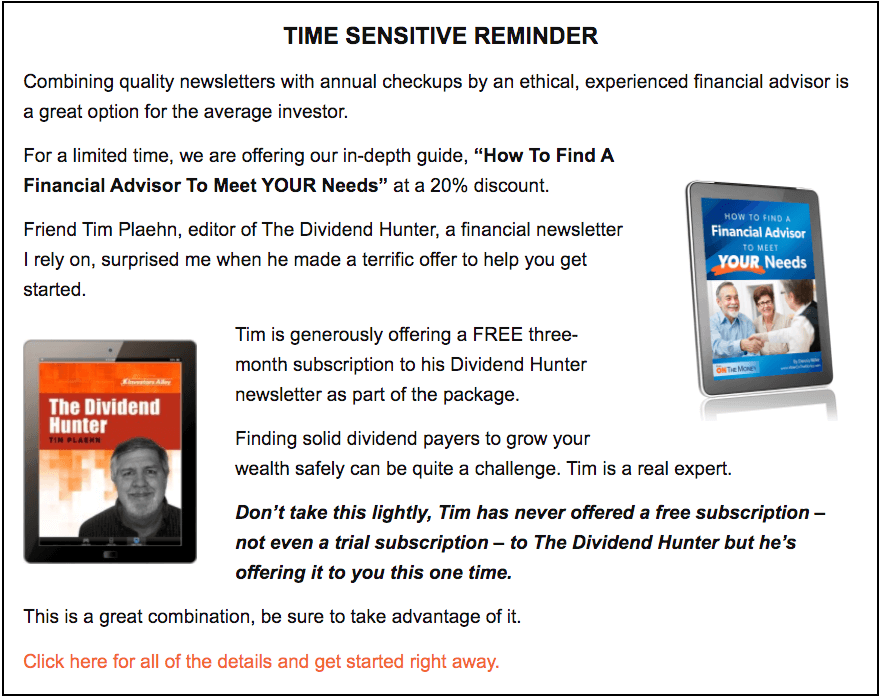 I ran into the house crying. My grandmother grabbed some ice and pressed it to my face. I was a first-grader and had never been on a farm before. I knocked down a wasp’s nest with a broom. I got nailed, and it hurt!
I ran into the house crying. My grandmother grabbed some ice and pressed it to my face. I was a first-grader and had never been on a farm before. I knocked down a wasp’s nest with a broom. I got nailed, and it hurt!
My grandfather looked at the welt. He smiled, and calmly said, “Now you know why I told you to leave them alone. You don’t know, what you don’t know; and it can hurt you.” I’ve never forgotten his sage wisdom.
How many lessons do little boys have to “learn the hard way” by ignoring advice and experience of others?
The value of experience
The responses to our recent special report, “How To Find A Financial Advisor To Meet YOUR Needs” has been terrific. No matter the size of your nest egg, all investors would benefit from sound advice from a licensed, qualified financial advisor.
Many investors are unclear about the best type of help to suit their needs, the role an advisor would fill and the costs involved.
I am not a licensed financial advisor, do not recommend any firms or accept any type of referral fees. This letter is educational, sharing my experiences and others. Why learn the hard way?
A personal experience
When my father-in-law passed away, I looked after my mother-in-law’s (affectionately known as grandma) investments. Mary, our stockbroker had tons of experience. She was a saint, helping us with the heavy lifting when grandpa died.
After things were settled, she asked about the family farm. It had been in my wife Jo’s family for 100 years, and a portion would eventually be passed down to Jo and her sister.
Mary took the value of the farm and calculated the inheritance tax. Had grandma died at that time, we would have to sell the farm to pay the taxes. We couldn’t do that; the entire family wanted to keep the farm for the next generation.
Mary suggested we get a life insurance policy that would cover the amount of inheritance taxes when the time came. We followed her advice.
None of us would have ever thought about that; we dodged a huge potential financial bullet. I recall saying, “We didn’t know, what we didn’t know.” We learned from the experience of others – not the hard way.
Certified Financial Planner (CFP) – a much higher standard
In our report, I emphasize credentialed Certified Financial Planner practitioners (and Registered Investment Advisors) are held to the Fiduciary Standard of ethics. That means they must put the client’s needs ahead of their own.
Traditional stockbrokers and other advisors without that designation are not held to that standard and may guide a client into sub-optimal investments that pay them higher commissions or fees.
While the ethical standard for the CFP is the best you can get, earning that designation requires them to bring much more to the table than just picking investments.
The CFP Board outlines four elements necessary for certification.
Education – Not only do you need a college degree; you must also complete extensive course work through a CFB Board Registered Program:
As part of earning your CFP® certification, you’ll need to complete college or university-level coursework through a CFP Board Registered Program. You’ll become well-versed in these major personal financial planning areas:
- Professional Conduct and Regulation
- General Principles of Financial Planning
- Education Planning
- Risk Management and Insurance Planning
- Investment Planning
- Tax Planning
- Retirement Savings and Income Planning
- Estate Planning
- Financial Plan Development.
This process takes a year or more to complete, it is not a weekend event. In addition, they are required to continue with their education to maintain their coveted certification.
I was happy to see “education planning” on the agenda. A good financial advisor must be an educator, both spouses need to know what is going on.
| Part of their job is to teach you what you don’t know. |
Exam – The testing is rigorous:
Test topics include the financial planning process and principles, tax planning, income and retirement planning, estate planning, risk management and insurance, among other important topics. All facets of the exam are guided by CFP® professionals, including determination of content coverage, scoring and passing criteria.
Note: Testing on key elements of the 2019 SECURE Act will be included in the September 2020 exam.
A credentialed CFP is much more than a stock picker. They are trained to look at the big picture. Good ones have a professional, ethical network of accountants, CPAs, attorneys and insurance experts they work with.
While they may be paid a percentage of “assets under management”, I have seen them recommend gifting part of a nest egg to children, which reduces what they earn in fees.
| Remember, they must put their client’s best interest ahead of their own. |
Experience – Here is what is required:
Ultimately, you must complete 6,000 hours of professional experience related to the financial planning process, or 4,000 hours of apprenticeship experience that meets additional requirements.
Qualifying experience includes activities involving the delivery of financial planning services to individual clients. Whether you engage with clients directly, supervise or support the financial planning process, …there are many ways to complete the experience requirement.
Activities that do not relate to the personal financial planning process for clients (such as time spent in corporate finance, training, practice management, marketing, software development or administrative duties) cannot be included in your reported number of experience hours.
| No investor wants someone managing their money while driving on their learner’s permit. |
One CFP friend said they have little problem recruiting new hires. A lot of senior stockbrokers, with a cadre of long-term clients, come to them.
Apparently, they do not like the pressure the major brokerage firms put on them to direct their client’s money into profitable products that may not be in their client’s best interest. That leads into the next point…
Ethics – Here is what the CFP board says on the subject:
“Candidates must complete the Application for CFP® Certification that contains the Ethics Declaration. Based on this application, we’ll conduct a background check, apply the Fitness Standards and inform you when you’ve completed the ethics requirement.”
You can’t legislate ethics; they are basic human values.
Mary was a stockbroker in the days when they were paid transactional commissions. Brokers were encouraged to churn accounts and put client’s money into their high fee-based mutual funds.
She pushed back and protected her clients; explaining that she was one of the biggest brokers in the branch, and was in the “protected age group.” She would have had a heck of a lawsuit had they attempted to fire her. When she retired, we were assigned to a different broker. Shortly thereafter, we moved our accounts to an online broker.
CFPs pride themselves on their ethical standard. CFP practitioners are required to fully explain how they are paid. That includes any potential conflicts of interest and what they do about them. They can ill afford ethics complaints tarnishing their business. While there are no guarantees that all bad apples are removed, the odds are much greater in an investor’s favor.
| Don’t settle for anything less than a financial advisor who is held to the Fiduciary Level of responsibility. |
Can an average investor afford it?
Mega-millionaires can afford to hire competent, credentialed professional help. Where does the average person (who does not have millions), who rolled their 401k or IRA into a self-directed account, get help? They are unlikely to be experts on insurance, annuities, estate planning, taxes and investments. What type of help is available for them?
As a minimum, I recommend an annual checkup, like going to the doctor once a year as “preventive medicine”. This is normally a one-time fee, as opposed to regularly monthly fees for asset management.
One reader wrote he pays for an “annual checkup.” The CFP helps him allocate his portfolio and rebalance. He handles all the investments himself trading online.
Another reader took it one step further, paying a little more for quarterly meetings and telephone access.
Use the CFP for what they are trained and qualified to do. Whether it is estate planning, wills, trusts, insurance, recommending investments, balancing your portfolio or the other big picture items, a CFP can help. Buy their experience, education and listen to their advice. That is what an annual checkup is all about.
Managing your investments is just a small portion of services they offer. Many investors use quality newsletters for investment choices and need guidance on risk management and keeping the portfolio balanced; others want a little more help.
A financial checkup is a “toe in the water” experience, not a long-term financial commitment. As you work with a CFP, your level of need/affordability will become clear.
One final tip. Normally one spouse is the “financially savvy” partner. What happens when he/she dies? A good financial advisor is continually educating both partners, so the surviving spouse is not terrified of losing their money, or financial predators when the other one died.
You don’t know, what you don’t know. Spend a few bucks for a checkup and learn from the experiences of others. Learning the hard way can hurt you.
For more information, check out my website or follow me on FaceBook.
Until next time…
Dennis
“Economic independence is the foundation of the only sort of freedom worth a damn.” – H. L. Mencken
Affiliate Link Disclosure This post contains affiliate links. If you make a purchase after clicking these links, we will earn a commission that goes to help keep Miller on the Money running. Thank you for your support!








Experience is a good teacher. A bad experience is a better teacher.